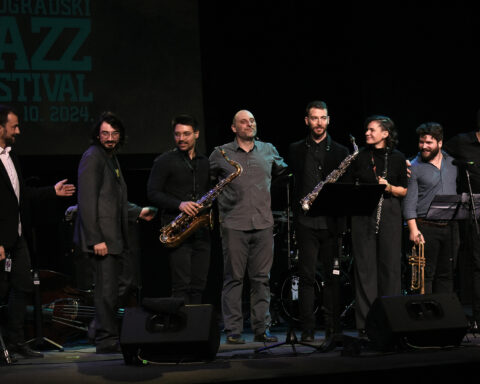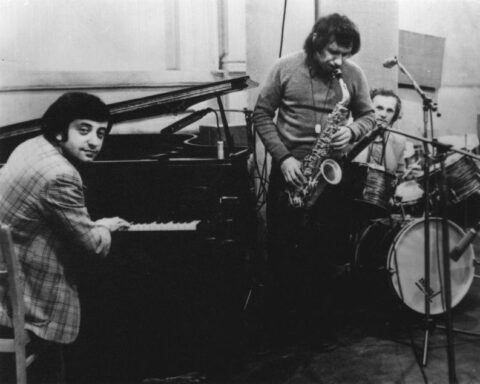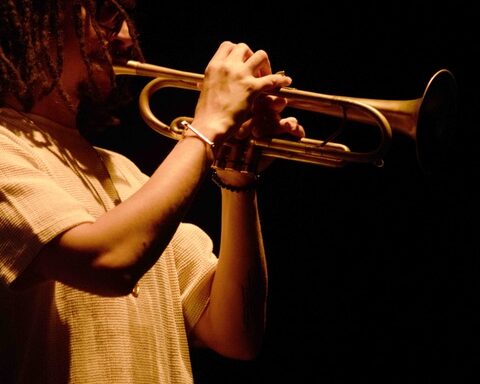The joys of jazz-related summer travel in Italy have long been known. I detail some of the fun I had at the Siena Jazz Workshop and Tuscia in Jazz Festival in Soriano nel Cimino in this lengthy blog posting.
But here are some tips for jazz journalists considering such trips. Though based on my experience of only ten days, during them I covered some ground.
- Plan ahead but stay loose. I was invited to lecture in Siena based on a relationship I struck up with historian/journalist/educator/fest organizer Francesco Martinelli at the 2008 international conference of jazz journalists produced by Columbia University’s Center for Jazz Studies, with assistance by the JJA. I learned about the Tuscia in Jazz fest just as I was about to leave the US, but I had intended to spend more time in Italy than what Siena offered me, so I could take advantage of the offer to take in Soriano, too. When going abroad, I like to give myself a day after arrival before starting any work responsibilities, if possible. And it’s nice to schedule a couple days extra, if that’s affordable in time and/or $ to take advantage of possibilities you didn’t know existed.
- Pack light. I’d taken one change of clothes more formal than I needed, and an extra pair of shoes. Those added weight to my bag and took away space I might have used to bring home souvenirs.
- The money thing: Travellers checks are now useless. I was surprised to find that the wad of cash I’d taken wasn’t much necessary, either. I drew Euros against my home bank account using my usual bank card, and charged whatever I could to have more convenient receipts/records. I should have researched my bank’s international charges before leaving the States, and also the credit card’s fees, but I have the impression that the bank fees won’t be as much as changing currencies would have cost, and that my Capitol One card has the lowest rates for overseas charges of any.
- In-country travel connections: Don’t take ’em for granted. Arriving at Rome’s airport, there was little info about how to get to the bus I’d been told to take to Siena; I asked around, and was eventually able to get to the cross-Italy bus station several commuter-train stops away. Lugging my bag there made me wish for one of those with wheels. I was lucky there were multiple busses going where I wanted to go, but I missed one by minutes and had to wait 2 hours for the next. I shoulda looked ahead on this.
- Have local maps, but don’t be shy — ask! I found in Italy that actual street names on city’s signs (and route numbers on roads) were often different than those published by Michelin and in guidebooks. I found also that Italians were sympathetic when I seemed lost, and willing to point to the right direction. Of course it might have helped if I spoke any Italian.
- Renting a car: not a bad idea. Though it may seem like a luxury and a potentially foolish one to rent a car for several days to transverse a foreign land, I got a rather good (cheap!) deal from Hertz, and enjoyed tootling through the Chianti hills, across Tuscany and into the state of Lazio with a flexibility you just can’t get on train or bus. Warning: You’ve got to like to drive, and be good at it. I took mostly secondary roads, many of them winding, with tight curves, and stayed off major commercial routes, especially the autostrada. Gas wasn’t inexpensive, but a full tank took me a long way. City-to-city distances are shorter than in North America.
- Don’t drive into big, old cities. I spent hours circling Florence looking for the hotel in which I had made a reservation online, choosing it because it was central, near major tourist attractions. I ended up violating the city’s ban on driving through no-go zones and could have gotten a hefty fine (I think my hotel concierge headed that ticket off . . . but I’m watching the mails). Medieval walled villages were not built for cars; parking is scarce, can be expensive, and is typically on the outskirts of the ancient settlement.
- Media to bring along: Pens and paper notebooks come in handy; business cards are nice to have at hand. I left my laptop at home. Conversion for high-end electronic devices should be obtained from knowledgeable sources before you depart for territory unknown. I carried print books to read while traveling, but my always more savvy companion had her Kindle (already filled with unread page-turners) which gave her an advantage, as long as it was charged. Neither of had cell phones that worked in Italy. It would have been nice if we could have called each other, or emergency services if necessary, but we did without. We also had nothing upon which to read and respond to emails. Luckily, we were able to cadge a very little, highly strategic free online time from our hosts. Otherwise we would have gone to Internet cafés, but prices vary widely. Your hotel may be the most expensive place from which to go online or make a phone call.
- Good subjects abound. You probably won’t go abroad to hear music without any assignment approved in advance, but be alert to unexpected opportunities as your travel. At the jazz education sites I visited, American musicians who have not been written up in depth in many U.S. publications were readily accessible and often in the mood to talk. Take equipment for audio and/or video recording as well as a camera (or a really smart phone) and do interviews which you can try to sell upon return or use for later articles. (Bring backup formats like zip drives so you don’t run out of digital storage space). Don’t ignore native and local musicians who impress you, either — chances are they’ll be eager to talk (language may or may not be a problem), and you’ll have material that no one else has for when those foreign stars or up ‘n’ comers are people that editors want.
- Have fun, relax, go with the flow. No one wants to be an obnoxious guest in a gracious country. It’s ok not to know everything, though it’s true that you may have information others can use (so share it). Embrace having arrived at a place where you can certainly learn something. Being a journalist may give you some entree and credibility, but not outright privilege. Trust trustable people, take interesting detours, look into topics beyond your usual interests, eat the local fare, keep the local hours (in Italy, a 2.5 hour midafternoon break must be taken into account). Make good connections. Follow through on offers and promises you make. Who knows, you may want, someday, to return.






